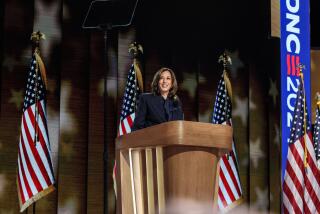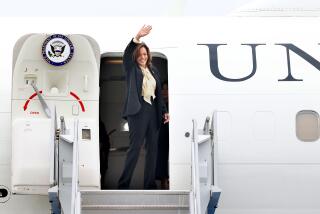The job she should want
CONVENTIONAL WISDOM has it that Hillary Clinton’s presidential campaign is an absolute certainty. But in Washington, many believe otherwise, fearing for her prospects and those of the Democratic Party she represents. And now there are fascinating hints that these forces are aligning to offer her a dignified way to demur from an ugly and ill-fated presidential effort, while still emerging a national leader.
Earlier this month, Steve Clemons’ blog, the Washington Note, quoted highly placed sources as saying that Democratic Senate Minority Leader Harry Reid had pulled Clinton aside and offered her a deal: Eschew the presidential campaign and succeed Reid as leader of the Senate Democrats in 2009. Reid’s office, of course, strenuously denies the claim. But Clemons, the director of the New America Foundation’s American Strategy program, is no fabulist, and this week, similar speculation showed up in Time magazine.
It’s obvious that someone wants word of this bargain to be fruitful and multiply. After all, it offers Clinton a way to disengage from an increasingly uphill effort, and it simultaneously floats the image of her in the minority or majority leader’s seat, a position she’s uniquely well-suited for.
Before running through her qualifications for the job, it’s worth explaining why she’d want it in the first place. After all, Clinton is the unquestioned front-runner for the Democratic nomination for president. She commands an unmatched war chest, an unrivaled collection of political talent (headed by her legendarily adroit husband) and star power that most putative candidates can only dream of.
But if her candidacy gleams in theory, its reality looks a little dimmer each day. Clinton is a polarizing figure, commanding a strong base of support but little room for growth. A CBS News poll in late July found her favorables at 32% and her unfavorables at 39% -- a worrying ratio for a figure so well established in the public mind.
Many of her potential competitors score far better on likeability indices, notably John Edwards, who’s turned his charm into a 4% lead in the crucial early presidential caucus state, Iowa. More troubling for Clinton, Democratic leaders have shuffled the caucus and primary schedule, placing Nevada after Iowa and South Carolina after New Hampshire. Nevada is essentially one big union town, mainly through the hotel workers union Unite Here, which Edwards is closely allied with. Then comes New Hampshire, where Clinton is ahead by single digits, and then South Carolina -- Edwards’ birth state, which he won in 2004. It’s a series tailor-made for Edwards, and thus daunting for Clinton.
Worse yet, the blogs -- the weathervane of the emergent left -- can’t stand Clinton. Markos Moulitsas Zuniga, proprietor of the liberal megasite Daily Kos, even took to the Washington Post to write of his distaste. And her problems don’t stop with the primaries -- surveys show she routinely loses to John McCain and Rudy Giuliani in head-to-head matchups.
So whatever the hype, Clinton’s path to the presidency isn’t an easy one. But the road to Senate leadership may be. Clinton possesses qualities that could turn the thankless, grueling realities of congressional preeminence into something glamorous and powerful. She’s a human megaphone, for one, able to focus the press corps on whatever it is she wishes to say that morning. Such a skill would prove invaluable to a legislative leader, allowing her to set the agenda and advance her priorities even from the minority.
Second, she’s an extraordinary fundraiser, far and away the best the Democrats have. She’s raised $33 million for a Senate reelection campaign that lacks a serious opponent -- partly the benefit of retaining the Clinton Rolodex, partly a function of her own magnetism.
Perhaps most important, her ability to bury enmities and forge alliances has been astonishing. She’s reached out to the bitterest foes of her husband’s presidency, seeking rapprochement with everyone from impeachment manager Sen. Lindsey Graham (R-S.C.) to bete noire Newt Gingrich. In the famously collegial Senate, where success relies on odd bedfellows and mountains of goodwill, she’s that rarest of creatures, able to conjure partisan passions when elections beckon but also to resurrect constructive relationships when legislation need be passed.
All those qualities would make her a superlative Senate leader, both for the health of the Democratic Party and the workings of the legislative body. Clinton, a serious policy wonk with a deep-seated drive to improve the world, could effect real change, possibly even more than the relentlessly partisan position of president would allow.
Better yet, her path to the Senate leadership is a far safer road, ensuring that Clinton’s trailblazing migration from first lady to senator remained unmarred by a catastrophic defeat in a presidential campaign. She would be the first woman to occupy the august body’s leadership position, and she would remain resolutely in the public eye, ready and waiting were the ground to shift and 2012 to look more inviting.
More to Read
Get the L.A. Times Politics newsletter
Deeply reported insights into legislation, politics and policy from Sacramento, Washington and beyond. In your inbox three times per week.
You may occasionally receive promotional content from the Los Angeles Times.










